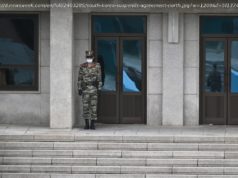Two months after booting their sitting president over corruption allegations, South Koreans will select a new leader Tuesday after weeks of heated debate
With the country’s previous conservative president in jail awaiting trial on corruption charges, the race has become a showdown between two liberal candidates: Moon Jae-in and Ahn Cheol-soo. Moon, a former human rights lawyer and aide to late liberal President Roh Moo-hyun, was the Democratic Party candidate in the last presidential election in 2012 and lost to Park Geun-hye. Ahn, a former doctor and computer software mogul, competed with Moon as an independent to be the single candidate representing liberal camps in 2012, but he dropped out at the last minute. He then joined Moon’s party in 2014 only to leave to form his own party a year later. Ahn is closer to the centre than Moon, and has been getting support from some conservatives disappointed by Park but who detest Moon. Still Moon has been leading in opinion surveys for months. After former UN Secretary-General Ban Ki-moon unexpectedly declared he would not run, Hong Joon-pyo became the leading conservative. The candidate for Park’s Liberty Korea Party, however, has suffered politically because of revelations in a 2005 memoir that he assisted a friend in a failed date rape attempt as a teen. Sim Sang-jung, a left-leaning candidate from the minor Justice Party, has struggled to get out of single digits in polls. South Korea’s election frenzy is not always noticeable on the streets: there are no bumper stickers, flags, door signs or balloons touting candidates. A strict election law says only registered campaign officials can use material displaying names and photos of candidates or parties with the purpose of promoting them during election periods. Candidates even face restrictions over the size of their name cards. Still, the electorate is deeply divided along ideological and generational lines and also by decades-long regional loyalties. The campaign has grown bitter online, with message boards and social media sites overflowing with testy exchanges between supporters of Moon, Ahn and others. Many see a Moon presidency as hurting ties with the US, Seoul’s most important ally, and setting up a potential clash with US President Donald Trump, whose administration recently settled on a strategy that emphasises increased pressure on Pyongyang with the help of China, the North’s main benefactor. Moon has said repeatedly that he won’ t tolerate any provocation by North Korea and has vowed to boost surveillance and anti-missile capabilities. He also says he wants a more assertive South Korea, which would persuade Washington to improve ties with Pyongyang, try to restart dormant regional disarmament-for-aid talks and push for a permanent peace treaty on the Korean Peninsula. Times have changed since liberals were last in charge in Seoul and many experts don’ t expect that Moon would push for any big reconciliation projects because North Korea has gone too far in its nuclear development over the last decade. Public views on North Korea have also changed a lot since Kim Jong-un became leader in 2011 and began cementing his power by executing officials, upping the number of missile launches and conducting three nuclear tests. Fewer South Koreans still believe economic assistance could get the North to abandon its nuclear ambitions. Still, many analysts believe that either Moon or Ahn would at least open the door for talks with North Korea. Also at play is Park’s decision to allow the deployment of a sophisticated US missile-defence system to cope with the North Korean threat. China, South Korea’s largest trading partner, sees the system’s radars as a threat to its own security and has retaliated by such measures as halting package tours to the South. Moon has shown ambivalence over the US missile defence system THAAD, which has been deployed in the South to the fury of China, saying it should be up to the next administration to decide. But it was declared operational this month, potentially presenting him with a fait accompli. That could all lay the ground for a difficult relationship with Trump – who has demanded that Seoul pay for the “billion dollar” system. Ahn initially opposed THAAD deployment but later supported it amid deepening anti-North Korea sentiments. Moon also toned down his THAAD criticism, saying its deployment would be inevitable if North Korea continued provocations. The man tipped to be elected South Korea’s new president has said he wants to hire more firefighters, teachers and policemen, but his main objective will be to protect a fragile recovery in Asia’s fourth-largest economy. Moon Jae-in is the favourite to win Tuesday’s election and become the first liberal president in South Korea in nine years. But he seems unlikely to raise taxes or radically change policies followed by conservative governments, economists say. Moon has hired conservative economist Kim Kwang-doo as his adviser for economic policy, and media have said he may be named prime minister or a senior cabinet minister in the new administration. Like Kim, some of Moon’s other key advisers are also long-time advocates of tax cuts and lower regulations. People who have worked closely with the Moon campaign say the presidential frontrunner will be careful not to hurt a fragile economic recovery. That implies no radical change in policies for now, which will be positive for markets. Ahn Cheol-soo’s supporters believe that as South Korean president he’ ll rise above a political culture long bogged down by corruption and factional bickering. Ahn says he, instead of a more traditional politician like Moon, can better rebuild the country after Park’s fall, which he says exposed a decades-long “accumulation of evils, ” such as abuse of presidential power and corruptive ties between politicians and big businesses. Ahn wants to curb the excess of the “chaebol”, referring to a privileged group of family-owned conglomerates such as Samsung and Hyundai, which have been criticised for bribing politicians for business favours and unfairly crushing smaller companies in competition. Ahn’s ideas include strengthening the powers of the country’s fair trade watchdog so that it could break up companies with excessive market shares.
Home
United States
USA — Korea South Korea votes: Kim Jong-un, Trump, THAAD, China, corruption big factors in...






